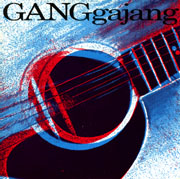Gang Gajang are an Australian pop rock band which formed in 1984. The four founders are frontman Mark 'Cal' Callaghan (ex-Riptides) on guitar and lead vocals, Chris Bailey on bass guitar, Graham 'Buzz' Bidstrup on drums and Kayellen Bee vocals and percussion. They were soon joined by Geoffrey Stapleton (ex-Aliens] on keyboards, guitar and vocals, and Robbie James on lead guitar. Their most popular song, "Sounds of Then ", was issued in December 1985 and peaked in the top 40 on the Australian Kent Music Report Singles Chart. It gained further exposure in Australia ten years later when it was used on TV in a Coca-Cola ad and then for the 1996 Nine Network station ID promotion. Their highest selling album was GANGgajang, which was released in November 1985. They have issued three other studio albums, Gang Again, Lingo and Oceans and Deserts.

The Essential is a greatest hits album released by Gang Gajang in 1996. It features all the tracks from their 1985 self-titled debut and several songs from their other albums.
"The Real Thing" is the debut single by Australian singer Russell Morris, released in 1969. Written by Johnny Young and produced by Ian "Molly" Meldrum, it was a huge hit in Australia and has become an Australian rock classic. It also achieved success in the United States, reaching the top of the charts in Chicago, Houston, and New York City.

Gang Gajang is the self-titled debut album from Gang Gajang. It was released on True Tone Records through Polygram Records in 1985 and sold over 120,000 copies. It was produced by Joe Wissert, with band members Graham 'Buzz' Bidstrup and Mark Callaghan.

Gang Again is the second studio album recorded by Australian band Gang Gajang. It was released in 1987 by True Tone Records and distributed by Polygram Records.
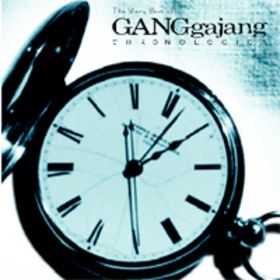
Chronologica is a double album by Gang Gajang, released only in Brazil in 2000 on Tronador Records.

"Friday on My Mind" is a 1966 song by Australian rock group the Easybeats. Written by band members George Young and Harry Vanda, the track became a worldwide hit, reaching No.16 on the Billboard Hot 100 chart in May 1967 in the US, No.1 on the Dutch Top 40 chart, No.1 in Australia and No.6 in the UK, as well as charting in several other countries. In 2001, it was voted "Best Australian Song" of all time by the Australasian Performing Right Association (APRA) as determined by a panel of 100 music industry personalities. In 2007, "Friday on My Mind" was added to the National Film and Sound Archive's Sounds of Australia registry.

"Throw Your Arms Around Me" is a song by Australian rock band Hunters & Collectors first released as a single in November 1984 by White Label for Mushroom Records. A re-recorded version of the song later appeared on the band's 1986 album Human Frailty. Written by bass guitarist John Archer, keyboardist Geoffrey Crosby, drummer Douglas Falconer, trumpet player Jack Howard, recorder/mixing engineer Robert Miles, vocalist/lead guitarist Mark Seymour and trombone player Michael Waters. The song captures the intensity of sensual love at the same time portraying its fleeting nature with lyrics including "And we may never meet again, So shed your skin and let's get started".

Semantics was a 1983 EP by Australian surf rock band Australian Crawl. The album marked a change in the line-up of the band as Bill McDonough (drums) was replaced first by Graham Bidstrup to record the EP. The more permanent replacement, after the EP, was John Watson.

True to the Tone is a compilation album released by Ganggajang in 1995. Songs are mostly from their first two studio albums.

"Power and the Passion" is the second single from Midnight Oil's 1982 album 10, 9, 8, 7, 6, 5, 4, 3, 2, 1. The song is one of the band's most famous, and it was performed on every Midnight Oil tour since the issue of 10, 9, 8, 7, 6, 5, 4, 3, 2, 1 as well as at the WaveAid concert.

"Errol" is the second single by Australian surf rock band Australian Crawl taken from their 1981 album Sirocco. The song was written by James Reyne and Guy McDonough and sung by McDonough instead of Reyne, and is a lyrical biography about Australian-born actor Errol Flynn. It was produced by Peter Dawkins.

"Wide Open Road" is a single released in 1986 by Australian rock band The Triffids from their album Born Sandy Devotional. It was produced by Gil Norton and written by David McComb on vocals, keyboards and guitar. The B-side "Time of Weakness" was recorded live at the Graphic Arts Club, Sydney, November 1985 by Mitch Jones, mixed by Rob Muir. "Dear Miss Lonely Hearts" was recorded at Planet Sound Studios, Perth and produced by the Triffids. "Wide Open Road" reached No. 26 on the UK Singles Chart in 1986, and No. 64 on the Australian Kent Music Report Singles Chart. In May 2001 the Australasian Performing Right Association (APRA), as part of its 75th Anniversary celebrations, named "Wide Open Road" as one of the Top 30 Australian songs of all time.
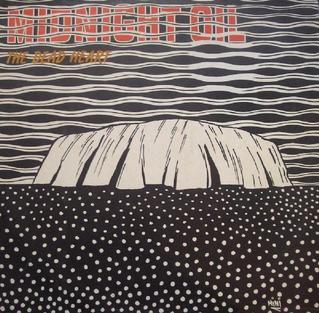
"The Dead Heart" is a song by Australian rock band Midnight Oil. It was first released as a single in Australia in 1986 and in the United Kingdom and the United States in 1988 after it had been included on the 1987 album, Diesel and Dust. It peaked at number four on the Australian singles chart and at number 11 on the U.S. Mainstream rock chart.
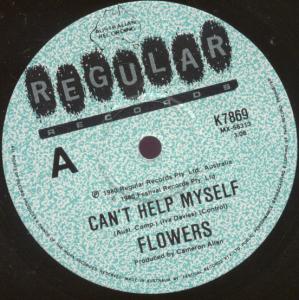
"Can't Help Myself" is the first single released by the Australian synthpop/rock band Flowers, later known as Icehouse. It was released in May 1980 as a 7" vinyl single on independent label, Regular Records, five months ahead of debut album Icehouse. A 10" vinyl single was released in July and had a cover depicting individual images of band members diagonally across the band's name and the single's title. It peaked at #10 on the Australian Singles Charts.
Graham Leslie "Buzz" Bidstrup is an Australian musician, songwriter, music producer and talent manager. He was a member of the Angels (1976–1981), the Party Boys (1983–1984) and Gang Gajang. He has managed Jimmy Little, Nathan Cavaleri and Diana Ah Naid. He was the CEO of the Jimmy Little Foundation from 2005 to 2015 and is the founder and Managing Director of associated Uncle Jimmy Thumbs Up Ltd.
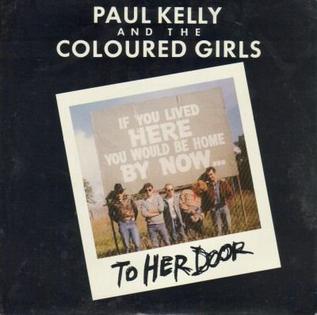
"To Her Door" is a song by Paul Kelly and the Coloured Girls, released as a single ahead of their second album, Under the Sun. The single was released in September 1987 and reached No. 14 on the Australian singles charts.
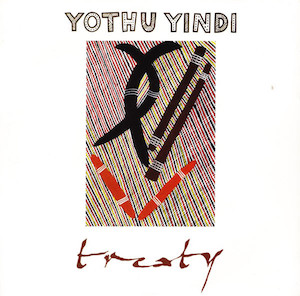
"Treaty" is a protest song by Australian musical group Yothu Yindi, which is made up of Aboriginal and balanda (non-Aboriginal) members. Released in June 1991, "Treaty" was the first song by a predominantly Aboriginal band to chart in Australia and was the first song partly in any Aboriginal Australian language to gain extensive international recognition, peaking at No. 6 on the Billboard Hot Dance Club Play singles charts. The song contains lyrics in Gumatj, one of the Yolngu Matha dialects and a language of the Yolngu people of Arnhem Land in northern Australia.
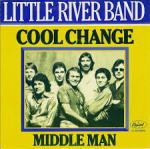
"Cool Change" is a song by Australian rock group Little River Band written by lead singer Glenn Shorrock. It was released in August 1979 the second single from their sixth album, First Under the Wire. The song peaked at number 10 on the Billboard Hot 100 the week of 19 January 1980.
"No Secrets" is a song by Australian hard rock group, the Angels, released in April 1980 from their fourth studio album, Dark Room. "No Secrets" peaked at number 8 on the Kent Music Report Singles Chart. It was co-written by band members, Graham "Buzz" Bidstrup and Bernard "Doc" Neeson. In January 2018, as part of Triple M's "Ozzest 100", the most Australian songs of all time, "No Secrets" was ranked number 50.
